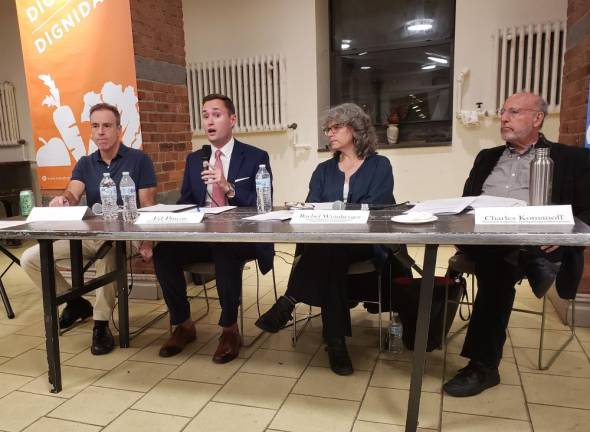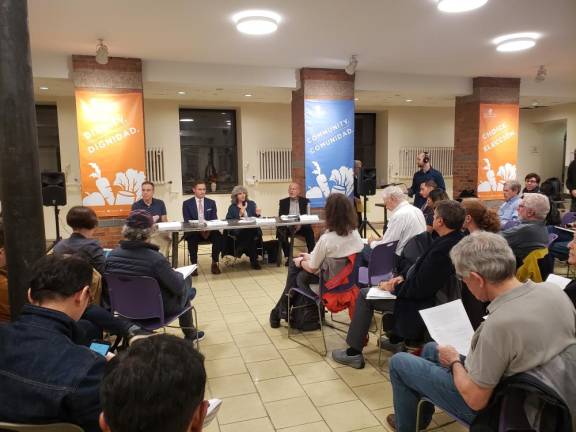Residents on the Upper West Side are tired of being seen as numbers. Analytics aside, they are people, not cash cows. “You look at us like we’re some form of revenue,” a woman said to a panel of experts during a special Community Board 7 meeting last week. “Do you look at your family members as how much revenue you can squeeze from them?”
That was the tone at the CB7 Transportation Forum on Oct. 29. Amid the shouting and debate, the consensus was that elected officials aren’t trying hard enough to connect with the community. With congestion pricing looming next year – which could mean more people parking on UWS blocks to avoid the cost of driving into midtown Manhattan – the main topic of discussion was the possibility of parking permits for residents. While cities like Boston, Chicago, San Francisco, Washington and Los Angeles all have them, New York is still hesitant.
A Panel of Experts
The evening was led by moderator and CB7 Transportation Committee Chair Howard Yaruss, and featured a panel made up of Ed Pincar, Manhattan Borough commissioner for the NYC Department of Transportation, Rachel Weinberger, senior fellow for transportation at the Regional Plan Association, and transportation and energy activist Charles Komanoff, creator of the model used by the state to analyze congestion pricing.
Residents raised two big concerns: If permit parking is implemented how much will it cost? And will there be enough spaces available?
Pincar told the attendees there is no quick fix or easy solution. He noted the DOT has studied permit parking, but with limited curb space, delivery vehicles, car services and more, there are obstacles before it could be approved. “We are trying to balance the varied uses on an individual block,” he said. “Our job at the DOT is to really strive for the right balance. We have to always be thinking about our curb management strategies.”
Clues from Portland
A survey from Manhattan Borough President Gale Brewer looked at programs in other cities and pointed to the potential cost to NYC residents. "For those who would like a Residential Permit Parking program to solve New York’s historic parking crunch — congestion pricing or not—experts do agree that there is a path forward here," the report reads. "However, the cost to achieve this ... could be too high a price to pay for some.
"Portland’s Northwest District serves as a useful example; here, a neighborhood with a density that pales in comparison to some of New York’s under-discussion neighborhoods has made some progress, yet also struggled to curb parking demand at the current price of $195 for the first permit (and $390 and $585 for second and third permits). For New York to properly handle excess parking demand, the price of permits may need to be several multiples of Portland’s Northwest District prices ."
“A Hunting License”
Weinberger wondered if a permit would be a legitimate benefit or simply a “hunting license.” If you have a permit and it still takes forever to park, is it worth it, she asked. “[A permit] gives you the right to look for a parking space in your neighborhood,” she said
Komanoff addressed the cost issue. He asked attendees to raise their hands if they would pay $250, $250 to $500, and more than $500. He was interrupted by people yelling “Why should they have to pay at all?”
Komanoff questioned the very idea of setting aside curb space for residents. “If it were up to me,” he said, “I wouldn’t do residential parking permits.” Instead, he said, he would price curb space, and the cost would vary depending on use.
A Community’s Needs
Many attendees felt the city is not looking out for them. One resident, a fourth generation New Yorker named Mark, asked if any of the panelists had ever considered talking to the people in the community about how they use their cars. “If you want to deprive us of the ability to visit our children, you’re not working towards a community,” he said. “What will it take DOT to actually accept its responsibility and actually manage the curb?”
Another attendee, Marc Gordon, stressed that curb management throughout the city is a mess. “If you look at the streets on the Upper West Side, it’s anarchy on every street,” he exclaimed.
Resident Julie Lindower said that while many people who have cars work outside of the city, they aren’t the only ones who need parking spots. People that work on the UWS, like porters, doormen and home health aides all typically commute within the city and need spots as well, she said.
“These people cannot afford what some of us who are blessed can, a $700 a month parking spot or even a $400 a month parking spot,” she said. “Unless we want to change this neighborhood into Hudson Yards and make it sterile, whatever is decided on we need to factor them in.”

